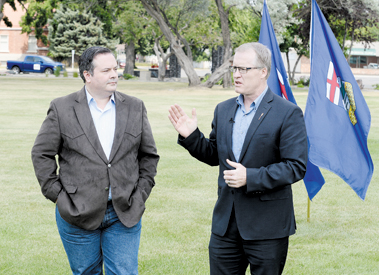Current Temperature
Alberta UCP government confident in capacity for COVID patients
Posted on April 22, 2020 by Taber Times TIMES FILE PHOTO
TIMES FILE PHOTOBy Nikki Jamieson
Alta Newspaper Group – Coaldale
According to their modelling, Alberta’s health care system has plenty of room to handle COVID-19 cases.
In a press conference for members of the Alberta Weekly Newspapers Association earlier this month, Premier Jason Kenney said they have created “excess capacity in the health care system”.
“To this point, what we’ve done is create a lot of excess capacity in the health care system. There’s a lot of empty acute care beds, and a growing number of empty ICU beds,” said Kenney. “I want to commend folks who work in the system for having been very innovative in expanding their capacity and the number of beds available, and the number of ventilators and so forth. So we think we’re well prepared on the public health side.”
When asked whether the province was considering pushing pause on implementing recommendations made in the Ernst and Young report — which aimed to identify ways that the province can reduce costs and improve performance for Alberta Health Services — until the COVID-19 crisis had passed and they could go back to the table to negotiate with doctors, Kenney said they were maintaining their budget with no cuts for overall physician compensation at $5.4 billion, and we’re increasing the health care budget by $600 million, so far.
“There is a false and misleading narrative out there that we’re cutting health care when the opposite is true. That is not an opinion, it’s an easily verifiable fact if you look at the budget documents,” said Kenney. “The Ernst and Young report was about how to get greater efficiencies in our health care system because we spend more than any other province, and our outcomes haven’t justified that. And so basically, it was about reallocating funds.”
One thing Kenney said both the reports and the McKinnon report had identified was that Alberta physicians, on average, made about $100,000 more than in other provinces.
Giving the example of Ontario, where he said the average general practitioner’s total gross billings is $300,000 compared to $400,000 in Alberta, he noted Ontario also had a higher cost of living and those in Alberta also benefited from lower taxes. Kenney stressed they respect and support Albertan’s physicians, and that, in part because of the pandemic, they have “pulled back” on implementing changes around complex modifiers, which was a “point of significant contention.”
Alberta Health Minister Tyler Shandro continues to have an ongoing discussion with the Alberta Medical Association, and they are in a responding mode to their concerns. Using an example from the beginning of the pandemic in Alberta, Kenney said there was no method for doctors to bill for telephone conversations with their patients, which was preferable to in-clinic visits in case someone came in and spread the virus.
“Minister Shandro and Alberta Health Services authorized a special billing code for telephonic consults with primary care physicians, and the physicians came back and said it wasn’t enough, and so we doubled it, and now the physicians are able to bill as much on the phone as they do for somebody who walks into their clinics.”
Kenney said the “whole effort here” was to control future mass cost increases, as physician compensation had gone up by 290 per cent in the past 18 years, and had grown faster than overall wages, inflation or the growth of the economy.
“We’re all in this together. We ask everybody to play a role in trying to salvage our province’s finances, but as I say, we have shelved the most contentious aspect of the reform of physician compensation,” said Kenney. “We think the optimal situation, especially for rural doctors, is for them to be on what are called alternative reimbursement plans — ARPs — which basically means they can get paid by the number of patients on their docket, the number of patients that they treat. Rather than a fee-for-service thing, it’s a contract form of compensation. One form of it is a monthly salary for all intents and purposes, and that, I think, would be a much stabler form of compensation for rural physicians.”
AHS plans to increase their capacity for acute care and ICU beds for COVID-19 patients. When asked where they be potentially located, Kenney didn’t have information for a specific city, but for southern Alberta outside of Calgary, they had 12 hospitals, 645 beds, 24 ICU beds and 31 ventilators available. A lot of what they were doing was identifying large urban hospitals and opening up more beds there.
Kenney said overall, they were aiming to have 2,250 acute care beds designated for COVID-19 patients, although they expect, according to their probable model, to see 818 hospitalized patients at the peak of the outbreak.
“We are building in significant, redundant capacity, in case we see a huge and sudden spike,” said Kenney.
One response to “Alberta UCP government confident in capacity for COVID patients”
Leave a Reply
You must be logged in to post a comment.




Freeing up beds by forcing those needing surgeries to wait maybe just fine for Jason Kenney but those suffering likely don’t think so. I haven’t forgotten how the Ralph Klein cuts almost cost my father his life and I haven’t forgotten the lawsuits that were launched against Klein for the deaths relayed to his health care cuts that taxpayers were forced to pay for. They were settled out of court, behind closed doors, under a gag order so families couldn’t disclose what they got. One man told me his uncle was one who died, his family sued and weren’t allowed to tell him what they got, but he knew it was huge. They went from being dirt poor farmers to Beverly Hillbilly types he said. What’s Jason Kenneys scheme going to cost us in the long run?